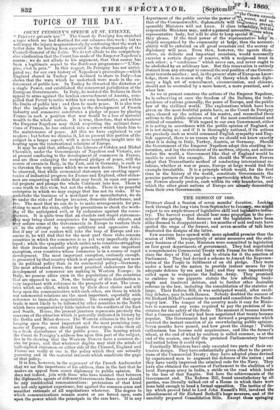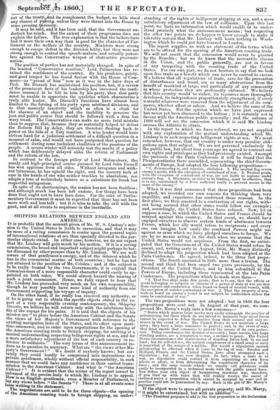THE SESSION OF 1860.
TthiSDAY closed a Session of seven months' duration. Looking back through the long vista from September to January, one might indus- try. to see- ample traces of legislative skill 'and legislative • The harvest reaped should bear some proportion to the pro- miseof the spring. But farmers and the legislators have been alike doomed to disappointment; ten months of cold and rain have spoiled the crops of the former, and seven months of talk have frustrated, the designs of. the latter. Few sessions have opened with more splendid promise than the session of 1860. Irrespectively of minor measures and the ordi- nary business of the year, Ministers were committed to legislation on four great departments of government. They had negotiated a comprehensive Commercial Treaty with France for the first time since the days of Pitt; and had to obtain for it the sanction of Parliament. They had devised a scheme to Amend the Represen- tation of the People in fulfilment of an old pledge. They were under a bond to the nation to provide instant means for its adequate defence by sea and land; and they were imperatively called upon to reorganize the Indian Army. They promised to embrace in one gigantic statute the law affecting bank- tit and insolvent debtors, and to further other desirable r OrThs in the law, including the consolidation of the statutes at large. Their Reform Bill, it was anticipated would, after cavil- ling debates, pass in both Houses. Nobody doubted the success of Sir Richard Bethell's exertions to amend and consolidate the Bank- ruptcy law. The temper of the country made it easy for Minis- ters to command any sums required to pay the premium of in- surance for the safety of the State. The moment it became known that a Commercial Treaty had been negotiated that treaty became popular. The Government had put forward a programme which received the instant sanction of an overwhelming public opinion. Seven months have passed, and how great the change! Public enthusiasm has become cold acquiescence and like the farmer's wheat, at the end of what by courtesy is called summer, so at the end of the session, one-half the promised Parliamentary harvest had rotted before it could ripen. Practically Ministers have only executed two parts of their ex-: tensive design. They have substantially given effect to the provi- sions of the Commercial Treaty; they have adopted plans devised by experienced men to augment the defences of the nation; • and they have vastly improved the criminal code for the Navy. They have also obtained the sanction of Parliament to the abolition of a local European army in India, a stride on the road which leads to the loss of that Empire. But here the achievements of the Government end. The Reform Bill, found unsatisfactory by all parties was literally talked out of a House in which there were none bold enough to head a formal opposition. The tactics of de- lay which proved fatal to Lord John Russell's Bill, involved the abandonment of Sir Richard Bethell's huge measure, and of the carefully prepared Consolidation Bills. Except those springing out of the treaty,kel it complement the budget, no bills stood fie
any chance of p sing unless they were thrust into the House by some pressing cessity.
It may be s d, and it has been said, that the Government un- dertook too much. But the extent of their programme does not explain the failure. The true explanation is that the talkers have had it more their own way than is good for the character of Par- liament or the welfare of the country. Ministers were strong enough to escape defeat in the division lobby, but they were not strong enough to control the speech-makers, and actually power- less against the Conservative weapon of obstructive procrasti- nation.
The position of parties has not materially changed. In spite of the boasted "Conservative reaction," Lord Palmerston has re- tained the confidence of the country. By his prudence, gaiety, and good temper he has found favour with the House of Com- mons—as "proud of him" now as it was in the later days of Peel. Mr. Disraeli has maintained his position, but, if a review of the prominent facts of his leadership has increased the confi- dence assumed to be felt in him by his party, then that party must be unable to appreciate the qualities which characterize a truly able leader. Mr. Disraeli's functions have almost been limited to the forcing of his party upon mistimed divisions, and to that masterly inactivity which so often is a cloak for the absence of an object and the inability to perceive the just and politic course that should be followed with a firm but wary tread. The Conservatives can make no more fatal mistake than to suppose that, because they so materially helped td defeat the Reform Bill by delay, they are therefore floating back to power on the tide of a Tory reaction. A wise leader would have striven hard for a judicious settlement of a difficult question in a moment of calm, and would not have postponed that question for settlement during some turbulent ebullition of the passions of the people. A severe winter will seriously test the merits of a policy which has deliberately delayed alike the reform of Parliament and the reform of the law.
In contrast to the foreign policy of Lord Malmesbury, the manly and high-principled course pursued by Lord John Russell has won applause from all sides. Without arrogance and with- out bitterness, he has upheld the right, and the country feels at ease in the hands of one who neither truckles to absolutism, nor adopts a tone of melancholy bounce as a substitute for frank but respectful antagonism.
In spite of its shortcomings, the session has not been fruitless ; and although much has been left undone, few things have been done that ought not to have been done. For the sake of Parlia- mentary Government it must be regretted that there has not been more work and less talk ; but it is wise to take the evil with the good, and at all events to acquiesce in the inevitable.



























 Previous page
Previous page